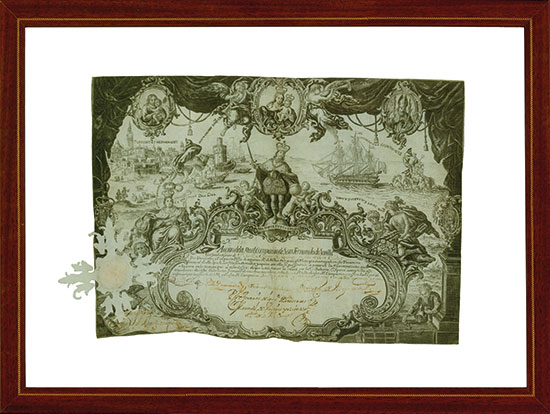Ingelsberg 17 b
D- 85604 Zorneding
Deutschland / Germany
Tel.: +49 (0)8106 - 2461-86
Fax: +49 (0)8106 - 2461-88
E-Mail: auktion@hwph.de
HWPH Historisches Wertpapierhaus AG –
Your expert for historical stocks, bonds
and financial history
|
||||
Item number |
665 | |||
Name |
Real Compania de San Fernando de Sevilla | |||
Location(s) |
Sevilla | |||
Country |
Spanien | |||
Region |
Europa | |||
Description |
Sevilla, 23.08.1748, Aktie über 250 Pesos, #785, 29,6 x 40,6 cm, schwarz, weiß, Ganzkupferstich mit Blindprägesiegel, Rand beschnitten, Erhaltung VF, abgebildet sind unter anderem der Heilige Josef mit dem Jesuskind, San Leandro – der Schutzheilige der Stadt Sevilla, sowie die Mutter Gottes mit dem Jesuskind im Strahlenkranz. Original-Signaturen der vier Direktoren, Autograph des Kassiers, E48-2, Plattentyp 3 nach Kipfer, die Aktie befindet sich im Doppelglasrahmen, R6! | |||
Description (English) |
Sevilla, 23 August 1748, Share of 250 Pesos, #785, 29.6 x 40.6 cm, black, beige, copper engraving with seal, edge trimmed, condition VF, we can see the Saint Joseph with baby Jesus, San Leandro which is the patron saint of Sevilla and Blessed Mother Mary with baby Jesus with corona, original signatures of the four directors and autograph of the cashier, Kipfer E48-2, plate type 3, the share certificate is between two glass plates in a wooden frame, R6! | |||
Condition |
VF | |||
 |
||||
History (German) |
Die zweitgrößte spanische Handelsgesellschaft wurde 1747 gegründet und sollte den Handel mit Südamerika betreiben. Von dort erhielt Spanien vor allem wertvolle Edelmetalle. Diese sollten die Staatskasse wieder füllen. Das Unternehmen besaß das Recht zum Handel mit den Kolonien, ausgenommen waren nur Caracas und Havanna. 1770 wurden Korruption und unseriöse Handelspraktiken aufgedeckt, die zum Niedergang und letztendlich zur Auflösung der Gesellschaft in den 1870er Jahren führten. | |||
History (English) |
The second largest commercial company was established in 1747 and was supposed to control the trade with South America. Spain mostly received valuable precious metals from there. They were supposed to fill the nation’s treasury. The company owned the right to trade with the colonies, only Caracas and Havana were exempt. In 1779, corruption and dubious trade practices were discovered which led to the demise and finally to the dissolution of the company in the 1870s. | |||
Please have a look at our highlight items: |
||||













